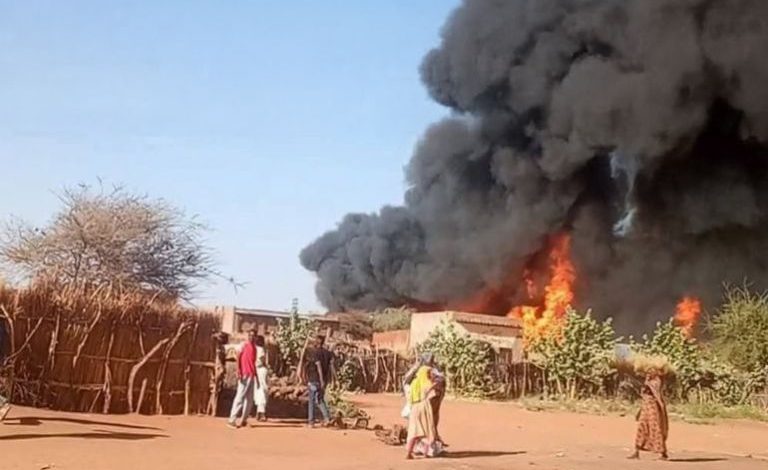What Are the Implications of the Army’s Recapture of Khartoum on the Battle for Darfur?

Sudan Events – Agencies
With the Sudanese army announcing full control over the capital, Khartoum, the conflict has clearly shifted westward, specifically to the Darfur region, which has once again come under focus amid escalating security and humanitarian complexities.
The town of Malha, located about 210 kilometers north of El Fasher near the Libyan border, has witnessed intense battles between the army and the Rapid Support Forces (RSF) militia, which is striving to prove its resilience despite its collapse and international accusations of committing severe violations against civilians.
The army’s recapture of Khartoum marks a strategic turning point, not only politically but also in terms of reallocating military resources to other fronts, such as Darfur. According to local reports, the army, in coordination with the Joint Forces of the Armed Struggle Movements, is expected to regain control of strategic points in Darfur soon.
A Critical Phase
Speaking to Al Jazeera Net, Transitional Sovereign Council member Salah Rassas stated that the ongoing military operations aim to restore state sovereignty and protect civilians from “militias” that refuse to disarm. He emphasized that the army will continue advancing on all fronts “to eliminate the militias and enforce security in the country,” adding that the next phase will be decisive, focusing on eradicating “terrorist hotspots” that hinder stability.
Rassas expressed deep concern over the humanitarian situation, particularly in Darfur, and asserted that the government is committed to opening safe humanitarian corridors and working diligently to provide necessary support to those affected. He stressed that the victories in Khartoum do not mark the end of the war but rather “the beginning of the final eradication of the militias and their supporters, both domestically and abroad.”
According to local activists in Malha, the army successfully repelled an attack by three RSF groups that stormed the area last Thursday, with some fighters managing to infiltrate the town.
The activists, who requested anonymity, reported that the attack came from the southwest near a Sudanese government Central Reserve Force position. Residents were caught off guard by the RSF fighters’ presence in the town, who “took over the market completely, resulting in around 40 deaths and multiple injuries, alongside committing atrocities in the area.”
Field reports indicate that the Sudanese army, in cooperation with the Joint Forces of the Armed Struggle Movements, has made significant advances in Malha to regain control of strategic locations. Meanwhile, various factions continue vying for dominance over vital supply routes and logistical centers across the vast desert, adding another dimension to the ongoing conflict.
Signs of Weakness
According to Colonel Ahmed Hussein Mustafa, spokesperson for the Joint Forces, “The RSF militia’s actions reveal its desperation, as it attempts to create diversionary events to mask its substantial defeats across multiple battlefronts.”
Speaking to Al Jazeera Net, he described these acts as “criminal attempts to escape a grim reality,” asserting that the RSF is in a state of complete collapse and no longer capable of influencing the situation. He affirmed that the Joint Forces “will continue pursuing them in all areas they have infiltrated.”
Malha holds strategic significance for military forces due to its prime location 210 kilometers north of El Fasher, near the Sudanese-Libyan border. This enhances the army’s ability to secure borders and monitor movements, making it an ideal base for military and logistical operations.
Additionally, the town serves as a crucial link between Sudan and Libya, allowing for control over trade and supply routes across the Sahara. According to local analysts, this is a key factor in military planning.
Furthermore, Malha’s active customs checkpoint plays a role in regulating the movement of goods and people, thereby aiding military operations. The presence of the Midob tribe in the region also adds a social and political dimension that can be leveraged in military strategies.
Consecutive Defeats
Yaqub Al-Damouki, former media advisor to the RSF leader and a defector from the group, told Al Jazeera Net that the “militia” seeks to capture Malha to secure critical supply routes that would allow it to receive military reinforcements from Libya and sustain its forces.
He noted that the situation has become more complex after the RSF suffered repeated defeats in Khartoum and other areas, such as Al-Jazira state, describing these setbacks as a severe blow that has negatively impacted the group’s strength and future prospects.
According to Al-Damouki, the RSF is now seeking an escape route “through coordination with Libya, specifically with Libyan National Army commander Khalifa Haftar,” reflecting its desperation for external support. However, he emphasized that all such attempts have failed, significantly reducing their chances of success. In light of these difficult circumstances, he predicted that the RSF could soon face total eradication.
Humanitarian Crisis
The ongoing battles in Malha and its surrounding areas have forced nearly 15,000 families to flee within just 48 hours, according to the International Organization for Migration (IOM), which made the announcement last Monday. In a statement, the IOM noted that displaced people have sought refuge in other parts of Malha, where the situation remains unstable and unpredictable.
Meanwhile, local residents reported severe difficulties in accessing humanitarian aid due to security blockades.
Testimonies shared on social media highlighted that dozens of families were forced to walk on foot to villages such as Basero and Takro, as well as the city of Dabba in northern Sudan. Additionally, communication networks have been completely disrupted, and many homes have been burned down, particularly in the southern and eastern neighborhoods of Malha. Parts of the city’s market and several trucks stationed at the customs checkpoint have also been looted.
(Source: Al Jazeera Net)



